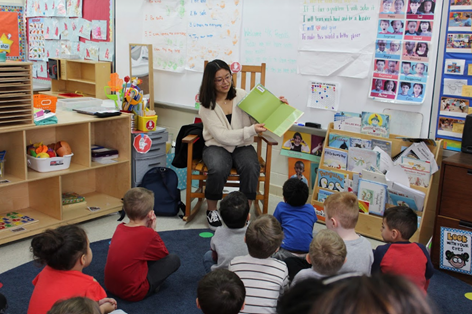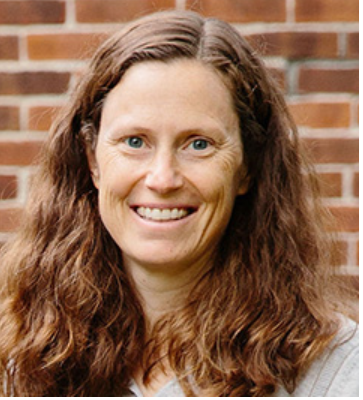UW–Madison Evaluation Experts Partner with Students, Staff at Capital High
Innovative partnership in Madison Adopt-a-School program includes new course
November 23, 2021 | By WCER Communications

Capital High student Mitzy Magallan reads to Orchard Ridge Elementary School students for a district event.
As part of an Adopt-a-School program, experts from the Wisconsin Evaluation Collaborative (WEC) at the School of Education’s Wisconsin Center for Education Research are partnering with Capital High School in Madison on a program of education and equity building.
Mary Bartzen, community partnerships director for the Madison Public Schools Foundation, said the arrangement prioritizes WEC’s unique contributions. While WEC has given more traditional support since the partnership started in early 2020 — volunteering, collecting of supplies — its most valuable resource is intellectual, in the form of a new class in culturally responsive research and evaluation being offered this academic year for students at the non-traditional public high school.
“The focus has been on WEC providing expertise, which is so incredibly valuable,” Bartzen says.
Benefits of the partnership, however, go both ways.
Supporting the school, which posted a graduation rate of more than 90 percent over the past 3 years, is a great opportunity for WEC to invest its resources on issues it values, including diversity and equity building, says WEC researcher Robin Worth.
“We just felt this was putting our money where our mouth was,” says Worth, who took some of the first steps to partner with Capital High. “I was so impressed with everything Capital High was doing. And as a side benefit it really helps us in WEC to have this common cause. It’s just one more way we bond as an organization.”

WEC Co-Director Annalee Good
A central piece of the partnership this year is helping students learn the skills involved in culturally responsive research and evaluation at Capital High, which is organized around project work and experiential learning. In keeping with that focus, the course syllabus includes a hands-on project in which students will each design, complete and report out on an evaluation study.
Enrollees at Capital High, who are generally from low-income backgrounds and the majority of whom are students of color, will do their evaluations in collaboration with scholars, educators and mentors from Madison Metropolitan School District (MMSD), the Madison community and UW−Madison.
“Capital High is an amazing organization,” says Annalee Good, co-director of WEC. “We have had an incredible experience working and learning with Capital High students and staff.”
Titled “Research and Evaluation for Equity,” the yearlong, English Language Arts course is designed to build an understanding of the advanced knowledge and skills needed to do research and evaluation that centers equity and supports social justice — values in keeping with WEC’s own mission, according to Good and Shahanna McKinney-Baldon, who will co-teach the course with Capital High English instructor Christina Grulke.
“The idea for us collaborating on a research and evaluation course came up in a conversation about how to better engage students in defining and measuring these ‘big’ ideas we have in education — learning, growth, power, health, voice, social justice,” Good explains. “Of course, from our perspective, sitting where we do at WCER, we said what better way to do this than through research and evaluation.”
Capital High students will learn about the genre of research and evaluation writing, before applying what they learn to create and present their evaluation projects.

WEC Evaluator Shahanna McKinney-Baldon
McKinney-Baldon, an evaluator at WEC, says the course for her will be an “incredible opportunity” to return to the high school classroom.
“I was a high school teacher for many years, and this is my favorite level to teach — so I’m thrilled to be partnering with the incredible students and staff at Capital High on this innovative partnership,” says McKinney-Baldon, also a former chief diversity officer at MMSD. “It is unique among Adopt-a-School programs, as it goes beyond traditional service projects and includes college-level coursework taught at the high school level.”
Capital High Principal Quinn Craugh welcomed WEC’s involvement, describing it as a needed addition to the cooperation that the growing school already enjoys with trade-focused internships and 2-year colleges. Capital High enrolls just over 200 students — an increase of 66 percent since 2019 — in three locations around Madison, but in fall 2023 will move into a single, central location in the district’s former Hoyt School at 3802 Regent St., following a $6 million building renovation.
“A partnership with WEC is extremely valuable and important to continue actualizing our equity vision at Capital High,” Craugh says. “We have built a school designed specifically around individualizing pathways for students and ensuring there is an opportunity for college and career readiness. One of the missing pieces that we’ve had is ensuring there are clear 4-year pathways into higher education.”
Craugh also notes the course was designed to meet existing curriculum requirements under the state’s Common Core standards, plus provide the enhanced rigor and expectations of an introductory course at UW−Madison.
“Partnerships with WEC and other community organizations are what really help us continue to focus on what is innovative about our school, not just what’s alternative,” he says.
About WEC: WEC evaluators support youth-serving organizations and initiatives through culturally responsive and rigorous program evaluation within the preK−12 education system, including school districts, professional associations, state agencies and education-based community organizations.


